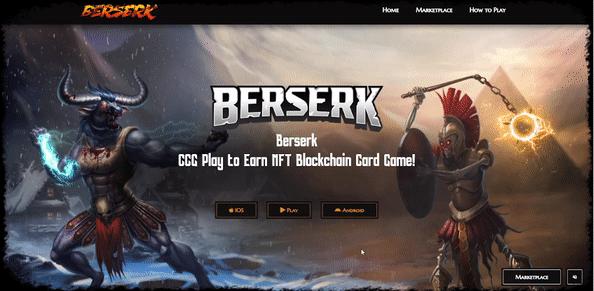
A roadmap for our Vulcanite strategy play-to-earn CCG
Berserk, our digital collectible card game, is going from strength to strength. Already the second biggest Vulcan Forged game, the new year has seen a few behind the scenes changes to spearhead this much loved strategy card game.
Team expansion
The Berserk team is growing! Sheldon, aka knowledgeable community member Dudemk3, has joined Vulcan Forged full time as Berserk Project Lead. The development team has also added 3 new members of staff and a 2nd full time QA team (after the one for VulcanVerse) has been brought on board to begin thoroughly testing the existing game, and checking upcoming implementations to ensure a smooth, bug free (or as close as possible!) release.
Community maketh the game
Berserk is all about community and from this helpful, supportive community a test team has been assembled. These eager testers will look to check and approve upcoming release features and content. This will help with game balance and provide feedback and more bug testing, earlier and more frequently.

A content rollout plan has been outlined for the year: new cards, new features, better stat tracking, shiny borders! Seasons, tournaments and goodies galore. The roadmap is being made available for players and supporters to track progress of the team.
Expanded Scope
Our vision for Berserk has grown significantly. From the initial seed of an idea, where Berserk initially flourished on webGL, it has now exceeded it’s limitations. As such, the team are working on a PC application version and will be dropping web support for Berserk completely. This is due to complete around early to mid-March. From then-on, the game will only be available as a mobile app (iOS and Android) and a downloadable PC app. This should provide much greater stability, and enable a far greater scope for future development with less restrictions and issues.
Harder, Better, Slower(?), Stronger
So what can be expected from the coming year for Berserk? A structured content release, slower, more predictable. In general, better.
Once the game reaches stability and Season 2 begins, content updates will slow to a single post-season patch (or 2 at most) to apply new balance, new content and bug fixes ready for the upcoming season.
There will be 6 seasons to the year, each season will run for 3 weeks followed by a week of tournaments. There will then be an off-season of 1 month to review data, implement balance changes, bug fixes, new rules, and content.

New cards, new release method
From this point forward, all new cards will follow the same 3 step process before being sold as NFTs:
- The card set will go onto the beta test server for community feedback and balance changes.
- The card set will be released to the public for free to everyone for 1 season.
- The cards and season stats will be reviewed, and balanced if necessary. Finally, they will be minted to NFTs ready for sale.
The reasoning behind this is that all cards will receive a wide amount of play testing before being immutably locked into an ability or power level. All players will have the ability to construct varied decks each season, but if they find a build they particularly like, they will eventually have to buy the cards to keep playing that deck.

Vulcan’s Vault
Vulcan’s Vault is a new approach to the origins card set (The original 40 NFT cards), and our clever way of solving the rental conundrum for NFT cards. Vulcan’s Vault will be a monthly premium pass that will enable temporary access to a variety of NFT cards (price TBA), the earnings from which will be distributed back to the NFT owners who chose to lock their cards up for the month.
This provides much greater access to the limited pool of NFT cards, but at the same time provides the ability for yield farming of those assets, that only grows with the popularity of the game.
More details on Vulcan’s Vault are to follow in a more in-depth article later.
About Vulcan Forged
Vulcan Forged is a blockchain game studio, NFT marketplace, and NFT minting engine. Vulcan Forged is the creator of VulcanVerse and Berserk, and many other games. The ecosystem is expanding rapidly, and many games are being enabled within the play to earn economy.
The native token used within the ecosystem is $PYR. The secondary token $LAVA acts as a play to earn tokens. This dual token economy structure is ideal for play to earn. Scholars will earn $LAVA while playing the Vulcan Forged games and will be able to forage special NFTs while in-game. These can be sold on the Vulcan Marketplace for $PYR.